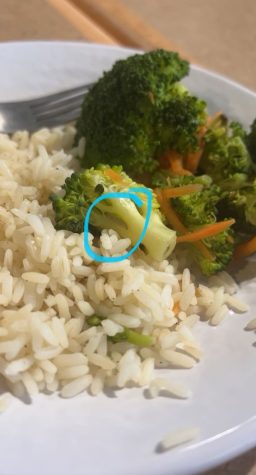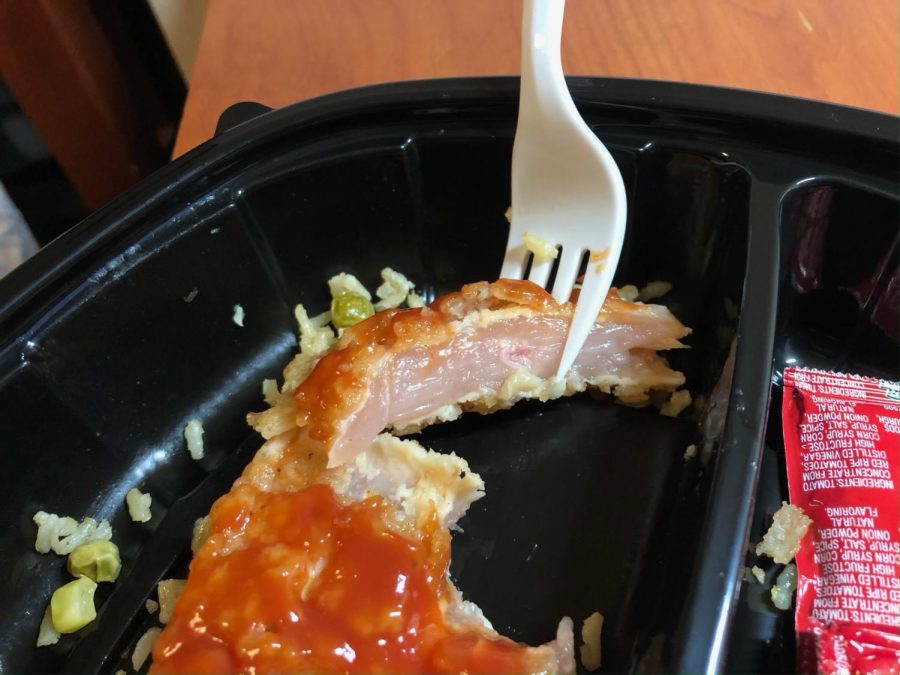Dining Dilemma: Students Still Unhappy With Lack of Significant Change
December 1, 2022
It’s been nearly two months since freshman Mallory Gard found a caterpillar in her broccoli, but she has yet to see major improvements in the food quality at Atterbury Dining Hall.
Throughout the course of this semester, students have reported food at the Atterbury Dining Hall as being “bland,” having an “odd-tasting undertone” or “undercooked.”
“Within the first week, I noticed that the food wasn’t good,” Gard said. “A variety of issues have occurred including: finding plastic in salads, bones in hamburgers, hairs in food and having undercooked or raw meat.”
Mallory Gard is a liberal arts major with a minor in chemistry in the BA/MD program.
Gard is not the only student who has had issues with the dining hall food. On Nov. 14, Jody Jeffries, director of the UMKC Student Union Operations, confirmed multiple counts of student complaints.

“We have received an additional nine inquiries or complaints about the dining hall including undercooked/overcooked food, low quality food, lack of variety in offerings, unfriendly staff and a lack of perceived value,” said Jeffries, speaking on behalf of the dining hall. “We take these criticisms very seriously.”
Being made aware of the issues, Jeffries assured that the dining hall staff has made “specific changes” such as the “doubling of quality checks” and “additional observation.”
“The protocols that are adhered to are consistent to meet the required expectations of the oversight of the health department and our third-party safety audit company,” Jeffries said. “On a meal-to-meal basis in the dining hall and all retail locations each day, our goal is to meet all applicable food-safety and food-handling standards.”
However, even two weeks after the alleged changes, students are still having trouble with the dining hall’s product.
“Since the incident, I have not found any bugs or other gross items in my food, but the baseline quality of the food remains the same,” Gard said. “It still lacks good flavor and nutritional value overall… this food still fails to be good for the amount we are forced to spend on it.”
Christopher Plants, another first-year student in the BA/MD program with a liberal arts major and chemistry minor, is still waiting for more impactful change to occur.
“I have not seen any changes in the food quality,” Plants said. “When it becomes unsafe or unsanitary to eat it, I have a problem with that.”
First-year biology major in the BA/MD program, Adanna Anikwe, voiced her concerns during a class meeting where she and other classmates were able to discuss their issues.
“It seemed like they were invalidating all [of] our complaints and trying to make excuses for the poor quality of food,” Anikwe said. “Comments were also made comparing food from other countries to the United States that I thought [were] very distasteful.”
However, Anikwe does feel as if things are moving in a more positive direction. Being a member of the First-Year Council, they were able to arrange a meeting with the dining hall department. First-Year Council allows 20 first-year students who reflect passion for student government and community change to get involved with a form of government before joining the Student Government Association.
“I couldn’t go to that meeting, but I heard positive things from it,” Anikwe said. “I have noticed an improvement [in] the quality of food. I do think the Dining Hall Services want to improve to fix and address our concerns.”













